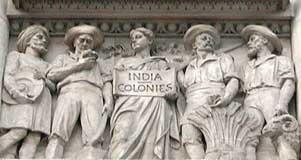 The British presence in India began in Elizabeth's times with a few trading
centers at Madras, Bombay, and Calcutta. In the eighteenth century, the French
decided to challenge the pre-eminence of the British East India Company, and
incited some of the states of the Mogul Empire to attack the British. Robert
Clive decisively defeated the French at the Siege of Arcot (1751), for control
of the Ganges delta. The French continued to contest Britsh control, however,
creating problems for Warren Hastings, the Governor General of the East India
Company's holdings between 1772 and 1785. He was impeached (unjustly, it now
seems) for high crimes and misdemeanors in 1794 but was acquitted. Lord Cornwallisfresh from Yorktown, Virginia, and Lord Wellesley (the Duke of Duke of Wellington's elder brother) consolidated British power and brought a measure of peace to the warring Indian states during theirn Governor-Generalships (1786-93 and 1794-1805, respectively).
The British presence in India began in Elizabeth's times with a few trading
centers at Madras, Bombay, and Calcutta. In the eighteenth century, the French
decided to challenge the pre-eminence of the British East India Company, and
incited some of the states of the Mogul Empire to attack the British. Robert
Clive decisively defeated the French at the Siege of Arcot (1751), for control
of the Ganges delta. The French continued to contest Britsh control, however,
creating problems for Warren Hastings, the Governor General of the East India
Company's holdings between 1772 and 1785. He was impeached (unjustly, it now
seems) for high crimes and misdemeanors in 1794 but was acquitted. Lord Cornwallisfresh from Yorktown, Virginia, and Lord Wellesley (the Duke of Duke of Wellington's elder brother) consolidated British power and brought a measure of peace to the warring Indian states during theirn Governor-Generalships (1786-93 and 1794-1805, respectively).
During the eighteenth century and the first half of the nineteenth, India was the place where many of the second sons of titled families (who would not inherit the family estate, and consequently had to choose between the Church and the Army) went as Army officers to make their fortunes. The British were more or less welcome (indeed, there were a number of highly connected Anglo-Indian families) until the Mutiny of 1857-58. Its immediate cause was the cartridge for the new Enfield rifle, which had to be bitten before it was loaded: Rumors spread that the cartridge was greased with cow-fat and pig-lard; and since the cow is sacred to the Hindus and the pig considered unclean by the Moslems, both religious groups were offended. After soldiers at Meerut mutinied and killed their officers in May 1857, British troops aided by Sikhs and Gurkas took a year to put down the rebellion.
The deeper causes of the Mutiny were resentment over the Westernization of India and fear that native customs, religions, and social structures would be lost. The India Act (1858), which abolished the East India Company and transferred its powers to the Crown, represented by the Viceroy, did nothing to alleviate those fears. Since 1853, India had been run by the Indian Civil Service, and the British only gradually allowed Indians to participate in the structure of government. In 1947, after a prolonged campaign of civil disobedience led by Mohandas Karamchand Gandhi (the Mahatma, or great soul), England gave independence to the colony, which was divided into India, an officially secular state with a largely Hindu population, and Pakistan, an officially Muslim state.
Created 1987; last modified 21 May 2003:
Thanks to Garvin Haslett for correcting an error.